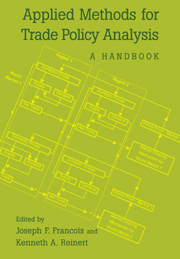Book contents
1 - Applied Methods for Trade Policy Analysis: An Overview
Published online by Cambridge University Press: 05 June 2012
Summary
After receiving their respective Ph.D.s, the authors of this chapter both set off to work at the U.S. International Trade Commission (USITC) in Washington. In our graduate studies, we had been steeped in mainstream international economics and, consequently, naively thought of ourselves as knowing at least the basics of what was necessary for working in an applied policy environment. Our delusions proved to be short-lived. Within a few weeks of our arrival at the USITC, it became apparent that there was a broad set of tools required for our jobs that were rather different from those emphasized in academia. There was also a need to temper these tools with a sense of policy relevance. Within months of our arrival, we needed to become versed in the nuances of imperfect substitutes models, trade data nomenclature, social accounting matrices, computable general equilibrium modeling, and a host of other concepts and methods. While the standard trade models continued to provide intuition in many areas, our day-to-day professional work was often in another realm entirely. In many cases, the applied work provided new and useful insight into the significance of various theoretical issues.
The purpose of this book is to assist others in their own professional journey from standard trade theory to applied trade analysis in a policy environment. Our objective is to make life easier for the graduate student working on an applied trade topic, the government or international organization economist engaged in the quantitative analysis of trade policy, or the policy analyst trying to understand what in the world trade economists are talking about in their reports.
- Type
- Chapter
- Information
- Applied Methods for Trade Policy AnalysisA Handbook, pp. 3 - 24Publisher: Cambridge University PressPrint publication year: 1997
- 10
- Cited by



